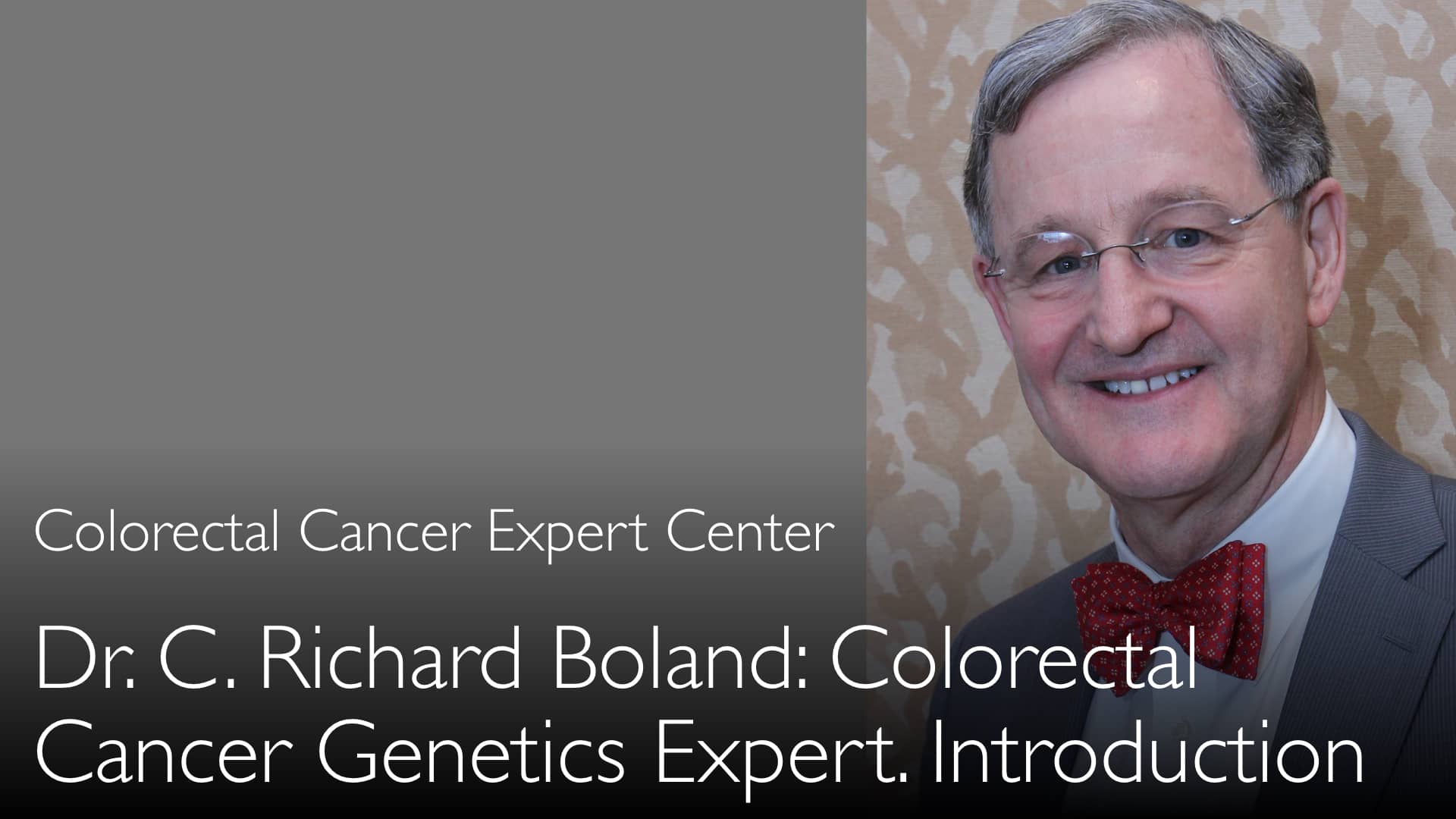Dr. C. Richard Boland, MD, en ledande expert på kolorektalcancergenetik, förklarar hur ärftlig tjocktarmscancer utvecklas tidigare än sporadiska fall på grund av ärftliga genmutationer. Han belyser varför familjehistorik och biomarkörer som mikrosatellitinstabilitet är viktiga, samt hur genetisk testning i kombination med förebyggande strategier kan stoppa ärftlig tjocktarmscancer innan den ens uppstår.
Ärftlig tjocktarmscancer: Tidig upptäckt och förebyggande strategier
Hoppa till avsnitt
- Tidig debut av tjocktarmscancer förklarad
- Ärftliga vs sporadiska cancermekanismer
- Varför familjehistorik spelar roll vid tjocktarmscancerrisk
- Gentestning vid ärftlig tjocktarmscancer
- Effektiva förebyggande strategier för högriskpatienter
- Biomarkörers roll vid upptäckt av tjocktarmscancer
- Fullständig transkription
Tidig debut av tjocktarmscancer förklarad
Dr. C. Richard Boland, MD förtydligar att "tidig debut av tjocktarmscancer" vanligtvis uppträder decennier tidigare vid ärftliga former jämfört med sporadisk cancer. Medan genomsnittsåldern för kolorektalcancerdiagnos ligger runt 68 år, utvecklas familjära fall ofta före 50 års ålder på grund av ärvda genmutationer som påskyndar cancerns utveckling.
Ärftliga vs sporadiska cancermekanismer
Dr. C. Boland, MD, förklarar den avgörande skillnaden mellan dessa cancertyper. Sporadisk cancer kräver två förvärvade mutationer i cancergener som APC, vilka vanligtvis ackumuleras över decennier. Vid ärftliga tillstånd som familjär adenomatös polypos (FAP) ärver patienter en redan muterad APC-gen, vilket ger varje tjocktarmscell ett "försprång" mot cancerutveckling.
Denna genetiska benägenhet förklarar varför ärftlig tjocktarmscancer uppträder tidigare – ibland redan i 20- eller 30-årsåldern – med en nästan 100% livstidsrisk utan åtgärd.
Varför familjehistorik spelar roll vid tjocktarmscancerrisk
Dr. C. Richard Boland, MD betonar att familjehistorik med tidig tjocktarmscancer bör leda till omedelbar uppmärksamhet. "Om tjocktarmscancer drabbar yngre familjemedlemmar bör de erbjudas tidig screening," framhåller han. Dr. C. Boland, MD, påpekar också att historik av livmodercancer kan tyda på Lynch-syndrom, ett annat ärftligt tillstånd som ökar risken för kolorektalcancer.
Förstagradssläktingar till patienter med ärftlig tjocktarmscancer har 50% risk att bära samma mutation, vilket gör noggrann kartläggning av familjehistorik avgörande för prevention.
Gentestning vid ärftlig tjocktarmscancer
Dr. Boland rekommenderar starkt germinal gentestning när familjehistorik eller tumörmarkörer tyder på ärftlig risk. "Att identifiera dessa mutationer förändrar allt," förklarar han. Positiva resultat möjliggör testning av anhöriga och införande av förebyggande åtgärder innan cancer utvecklas.
Mikrosatellitinstabilitetstestning (MSI) av tumörvävnad fungerar som en nyckelmarkör för Lynch-syndrom och vägleder vilka som bör erbjudas omfattande gentestning.
Effektiva förebyggande strategier för högriskpatienter
För mutationsbärare beskriver Dr. C. Richard Boland, MD två huvudsakliga förebyggande strategier: intensiv uppföljning och profylaktisk kirurgi. Frekventa koloskopier (ibland årligen) kan upptäcka och avlägsna förcancerösa polyper i tidigt skede.
Vid extremt höga riskfall som FAP kan profylaktisk kolektomi (borttagning av tjocktarmen) rekommenderas i ung vuxen ålder. "Dessa åtgärder kan helt förändra det ärftliga sjukdomsförloppet," noterar Dr. C. Boland, MD, och potentiellt eliminera cancerrisken helt.
Biomarkörers roll vid upptäckt av tjocktarmscancer
Utöver familjehistorik framhåller Dr. C. Boland, MD tumörmarkörer som kritiska riskindikatorer. Mikrosatellitinstabilitetstestning identifierar reparationsdefekter typiska för Lynch-syndrom. Immunhistokemi kan påvisa specifika defekta proteiner, medan moderna flergenspaneler testar för flera ärftliga cancersyndrom samtidigt.
Dessa verktyg hjälper till att identifiera högriskindivider som får störst nytta av genetisk rådgivning och skräddarsydda förebyggande åtgärder.
Fullständig transkription
Dr. Anton Titov, MD: Hur tidigt är en "tidig debut av tjocktarmscancer"? Hur förebygger man ärftlig tjocktarmscancer hos nuvarande generation av familjemedlemmar? Varför är historik av livmodercancer viktig för bedömning av tjocktarmscancerrisk?
Dr. C. Boland, MD: Vid familjära fall av kolorektalcancer debuterar cancern tidigare än vanligt. En intressant aspekt av att förstå kolorektalcancers utveckling är att sporadiska cancerformer, som uppträder i allmänheten utan specifika germinala mutationer, följer samma grundläggande mekanismer som ärftliga former.
Sporadisk cancer uppträder senare i livet eftersom mutationer måste förvärvas i båda kopiorna av en cancergen. Till exempel, hos de flesta med sporadisk adenomatös polyp, sker bialleisk inaktivering av APC-genen. Först drabbas en allel, sedan den andra. Det kan vara en mutation, deletion eller genmetylering.
Men om en person har familjär adenomatös polypos, föds de med en germinal mutation i en APC-genallel. Varje cell i deras tjocktarm är redan förberedd för canceromvandling och har ett försprång. Därför är risken för cancer mycket högre och debuten sker i yngre ålder.
Dr. Anton Titov, MD: Uppenbarligen, om man känner till en familjehistorik av kolorektalcancer, särskilt när cancern drabbar yngre familjemedlemmar, bör man vara vaksam och screenas, besöka läkare och följa ett förebyggande program för att upptäcka eventuella förcancerösa förändringar.
Dr. C. Boland, MD: Korrekt! Om familjehistoriken tyder på tjocktarmscancer, eller om det finns biomarkörer som mikrosatellitinstabilitet i tumören, är germinal gentestning lämplig. Detta avslöjar om personen har en mycket hög risk för tjocktarmscancer.
Det varnar också för att patientens syskon och barn kan behöva genetisk utredning. När en germinal mutation hittas, har varje förstagradssläkting 50% risk att ärva samma cancerframkallande gen och samma förhöjda risk.
Om vi upptäcker denna risk innan personen blivit sjuk, kan vi helt förändra det ärftliga sjukdomsförloppet. Det kan innebära fler koloskopier eller profylaktisk kirurgi för att avlägsna tjocktarmen, men det kommer att förhindra att ärftlig tjocktarmscancer någonsin utvecklas.





